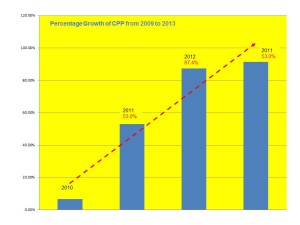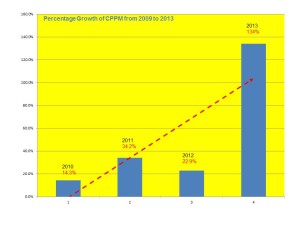CPP and CPPM Popularity Continues to Grow

Robert Menard
Certified Purchasing Professional,
Certified Professional Purchasing Consultant, Certified Green Purchasing Professional, Certified Professional Purchasing Manager
The Certified Purchasing Professional (CPP) and Certified Professional Purchasing Manager (CPPM) designations conferred by the American Purchasing Society are perhaps the most popular, and certainly the most valuable within the purchasing profession. During this extended economic downturn, businesses increasingly look to reducing costs in the supply chain to offset sluggish top line growth. The costs of doing business are everything else but profit. That means for a company that earns 10% net, the other 90% of revenue went out the door in various forms of cost. To properly manage costs, skilled, educated, and trained purchasing professionals are in demand.
There are two strong motivations factors contributing to the spike in the CPP and CPPM applications, one each for the employee and employer. The first is the individual practitioner’s (employee) perspective, an overpowering inducement is the direct correlation to earnings. The Society conducts an extensive salary survey annually that takes many factors into consideration including certification. By a substantial margin, those who have earned the CPP or CPPM earn more money.
This fact makes obvious economic sense. Those who are devoted to self-improvement and professional advancement do a better job and are therefore more valuable to employers. See what fellow purchasing pros have to say about the value of certification and the impact it had on their careers.
The input of these renown purchasing pros, and my interaction with many thousands of purchasing pros in hundreds of seminars, consulting assignments, and corporate training engagements prompted me to record this video. The Society has asked me to instruct and coach both CPP and CPPM students and it is an honor to do so. Helping those serious about their professional is a gratifying experience. Here is a post about which certifications you should pursue.
The second motivating factor is the demand from employers. Job seekers increasingly face the disqualifying barrier of lack of certification. Requirements of experience and academic education routinely run second to certification criteria in the current employment market. Employers view certifications in purchasing disciplines as mandatory to any management position.
The CPP program is for purchasing professionals who have demonstrated the skills to successfully implement improved purchasing and supply chain practices as part of a business solution in an organization. To learn more about the Certified Purchasing Professional (CPP) certification, click here.
 During the trough of the business doldrums in 2009, many purchasing pros lost the financial backing of employers to pursue training and especially certification. Using that year as the baseline, here are some daunting statistics about the value and demand of the CPP designation. In year 2010, CPP registrations grew 6.7% over 2009. Year 2011 saw a 53% jump over 2009, 2012 experienced an 87.4% growth and 2013 is on a trajectory for a 91.4% increase, almost double the enrollment in a four years period. The graphic view is to the left.
During the trough of the business doldrums in 2009, many purchasing pros lost the financial backing of employers to pursue training and especially certification. Using that year as the baseline, here are some daunting statistics about the value and demand of the CPP designation. In year 2010, CPP registrations grew 6.7% over 2009. Year 2011 saw a 53% jump over 2009, 2012 experienced an 87.4% growth and 2013 is on a trajectory for a 91.4% increase, almost double the enrollment in a four years period. The graphic view is to the left.
Clearly, the CPP is an influential force in the market and desired by both employee and employer alike. The steep trend line is ample evidence of the wisdom of earning the CPP designation.
If the CPP designation memorializes the skills, education, and training of purchasing practitioners, the CPPM designation should be obtained for anyone interested in purchasing management. As a prerequisite, this certification requires that CPP Certification already be obtained. To learn more about the CPPM click here.
 Again using the year 2009 as the baseline, CPPM applications for year 2010 grew 14.3% over 2009. Year 2011 saw a 34.2% jump over 2009, 2012 experienced an 22.9% growth and 2013 is on a trajectory for a 134% increase, far more than double the enrollment in a four years period.
Again using the year 2009 as the baseline, CPPM applications for year 2010 grew 14.3% over 2009. Year 2011 saw a 34.2% jump over 2009, 2012 experienced an 22.9% growth and 2013 is on a trajectory for a 134% increase, far more than double the enrollment in a four years period.
The total number of applications for CPPM is smaller than CPP because there are always fewer managers than staff members. Nevertheless, the trend line for CPPM almost exactly parallels the steep climb of the CPP trend line. To the right is the graphic view.
To apply for CPP or CPPM or for answers on administrative or content issues, please contact the Society at 630.859.0250, propurch@propurch.com. I’ll be happy to help as well by phone at 214.513.8484 or email robertmenard@propurch.com.